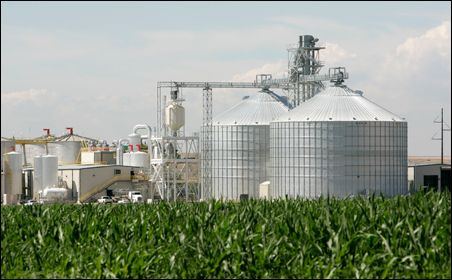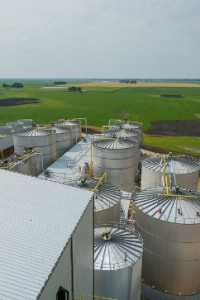
Project LIBERTY – Advanced Biofuels for National Security
POET-DSM’s Project LIBERTY is scheduled to open today (September 3, 2014) in Emmetsburg, Iowa.
This $275 million factory is an important, long-awaited day for the development of advanced biofuels. This plant converts corn crop residue to cellulosic bio-ethanol, a fuel that can be used as an additive to gasoline, replacing part of the oil-based fuel supply with renewable biofuels. Cellulosic ethanol is different from the currently-widespread corn ethanol in that it uses waste, not food-based corn, as the feedstock.
It is not the first cellulosic ethanol plant to go into service, but it is the largest to date. Building a substantial cellulosic biofuel capacity would be an important win for American energy security, as it would allow us to further wean ourselves off of the global oil market as well as helping to build food security, by reducing our usage of corn ethanol. It also is an important win for climate security, as it will provide renewable, low-emissions fuel. With this factory, the day when we all could run our cars on plant waste has come a big step closer.
Perhaps the most important part to note about Project LIBERTY is its transatlantic nature. As some have bemoaned the lack of strategic engagement between the United States and Europe over the last decade, businesses have bucked this trend through their continued to increase the direct investment across the Atlantic. This project is a partnership between the American firm POET, one of the world’s largest ethanol producers, and the Dutch firm Royal DSM, a biochemical and pharmaceutical company.
This partnership, agreed in early 2012, allowed POET to turn-down a loan guarantee from the Department of Energy to build the plant.
The stated goal of Project LIBERTY is to demonstrate the technology and business practices that will make this profitable. Once demonstrated, this package can then be replicated by POET throughout their currently operating American ethanol plants and then licensed to other companies around the world for the production of advanced cellulosic ethanol.
 The Dutch King, Willem-Alexander, will make an appearance at the opening of Project LIBERTY, signifying the importance of this project to the Dutch. Although the Netherlands is a country small in area, its companies have a history as being extremely important in making massive investments in the U.S. According to the Organization for International Investment (OFII), the Netherlands ranks as the third largest source of cumulative investment in the U.S. – and the largest single source of inbound investment in the U.S. in 2012, with nearly $30 billion invested in that year alone (the most recent year for which data is available). Of the top 10 sources of investment in the U.S. for 2012, six of them are members of the European Union. Completing the Transatlantic Trade and Investment Partnership would only serve to deepen this relationship.
The Dutch King, Willem-Alexander, will make an appearance at the opening of Project LIBERTY, signifying the importance of this project to the Dutch. Although the Netherlands is a country small in area, its companies have a history as being extremely important in making massive investments in the U.S. According to the Organization for International Investment (OFII), the Netherlands ranks as the third largest source of cumulative investment in the U.S. – and the largest single source of inbound investment in the U.S. in 2012, with nearly $30 billion invested in that year alone (the most recent year for which data is available). Of the top 10 sources of investment in the U.S. for 2012, six of them are members of the European Union. Completing the Transatlantic Trade and Investment Partnership would only serve to deepen this relationship.
A budding partnership between European and American businesses on energy is one of the trends to watch. American energy firms can partner with European industrial firms to build projects like this. Europeans are eager to learn from the American shale-gas revolution, while Americans should be eager to learn about energy efficiency measures. By partnering, we can work very closely together.
For more detail on ASP’s work on advanced biofuels, and why investment in biofuels is good for national security, read ASP’s 2013 White Paper, “Advanced Biofuels & National Security.” For more on transatlantic trade and the TTIP negotiations, read ASP’s Fact Sheet “U.S.-EU Trade & the Transatlantic Trade and Investment Partnership.” To hear more about the prospects for Advanced Biofuels, attend ASP’s Conference “What’s Next? Fostering the Next Generation of Energy Security” on September 30, where biofuels experts will talk about the development of the industry.







[…] Project LIBERTY – Advanced Biofuels for National Security Andrew Holland […]
[…] Project LIBERTY – Advanced Biofuels for National Security Andrew Holland […]
[…] Project LIBERTY – Advanced Biofuels for National Security Andrew Holland […]